Daily Vocabulary Words: List of Daily Used Words in Leading International Newspapers
Hi there. Welcome to this special section @ Wordpandit.
Our endeavour here is very simple: to highlight important daily vocabulary words, which you would come across in leading newspapers in the country. We have included the following newspapers in our selection:
• The New York Times
• The Washington Post
• Scientific American
• BBC
• The Guardian
• Psychology Today
• Wall Street Journal
• The Economist
We are putting in extensive work for developing your vocabulary. All you have got to do is be regular with this section and check out this post on a daily basis. This is your repository of words that are commonly used and essentially, we are posting a list of daily used words. Hence, this has significant practical application as it teaches you words that are used commonly in leading publications mentioned above.
Visit the website daily to learn words from leading international newspapers.
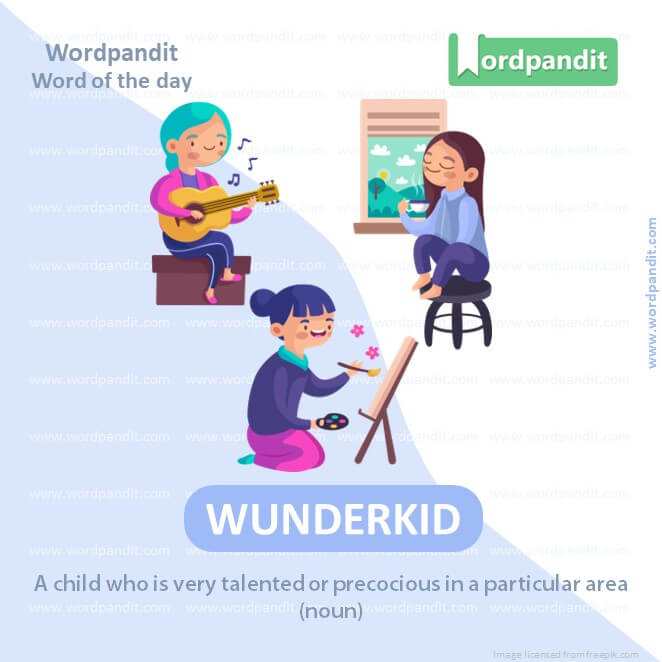
WORD-1: WUNDERKID
CONTEXT: This is how it goes in Silicon Valley’s youth bubble. From Meta to Snap to TikTok, the tech industry’s picture of its customers resembles that of the famously exclusionary fruity cereal: Silly rabbit, tech is for kids! Wunderkind founders are revered here, growing old is considered a disease in need of a cure, and ageism is barely concealed. In 2007, a year before he became, at 23, the world’s youngest self-made billionaire, Zuckerberg said the quiet part out loud. “Young people,” he told an audience at Stanford, “are just smarter.”
SOURCE: The New York Times
EXPLANATORY PARAGRAPH: Imagine a kid who is really, really good at something, like drawing, singing, or even solving puzzles. That kid is so amazing that everyone is surprised by how talented they are. We call such a kid a “Wunderkid”.
MEANING: A child who is very talented or precocious in a particular area (noun).
PRONUNCIATION: Woon-der-kid
SYNONYMS: Prodigy, genius, virtuoso, maestro, marvel, phenomenon, sensation.
USAGE EXAMPLE:
1. The 10-year-old piano-playing Wunderkid performed at the concert.
2. Everyone was talking about the Wunderkid who had just published a book.
3. The chess championship was won by a 12-year-old Wunderkid.
4. Her paintings are so professional, she’s truly a Wunderkid.
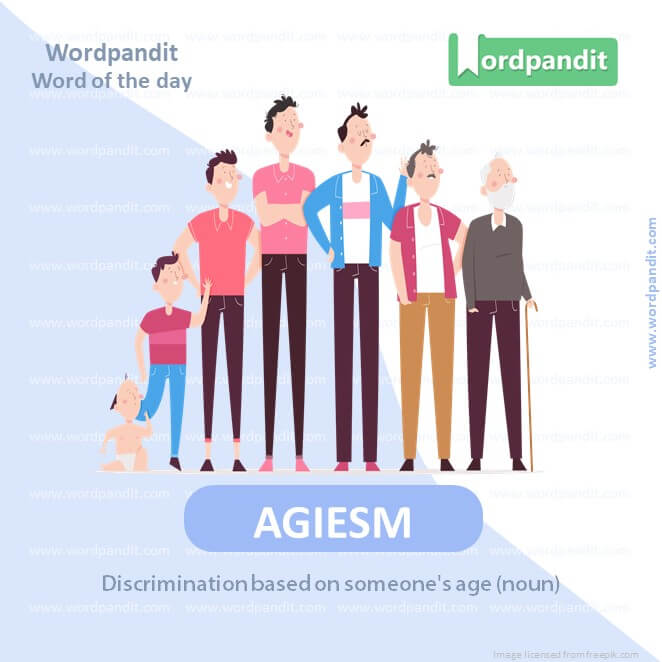
WORD-2: AGEISM
CONTEXT: This is how it goes in Silicon Valley’s youth bubble. From Meta to Snap to TikTok, the tech industry’s picture of its customers resembles that of the famously exclusionary fruity cereal: Silly rabbit, tech is for kids! Wunderkind founders are revered here, growing old is considered a disease in need of a cure, and ageism is barely concealed. In 2007, a year before he became, at 23, the world’s youngest self-made billionaire, Zuckerberg said the quiet part out loud. “Young people,” he told an audience at Stanford, “are just smarter.”
SOURCE: The New York Times
EXPLANATORY PARAGRAPH: You know how sometimes people treat others differently because of their age? Like, they might think someone is too old or too young to do something? That’s called “Ageism”.
MEANING: Discrimination based on someone’s age (noun).
PRONUNCIATION: Ay-jizm
SYNONYMS: Age discrimination, age prejudice, age bias, age-related bias, gerontocracy, gerontophobia, age-discrimination.
USAGE EXAMPLE:
1. Hiring someone based on their age is an example of ageism.
2. Ageism is a real issue in many workplaces.
3. Younger employees also face ageism when their ideas are dismissed.
4. Fighting ageism is crucial for a fair society.
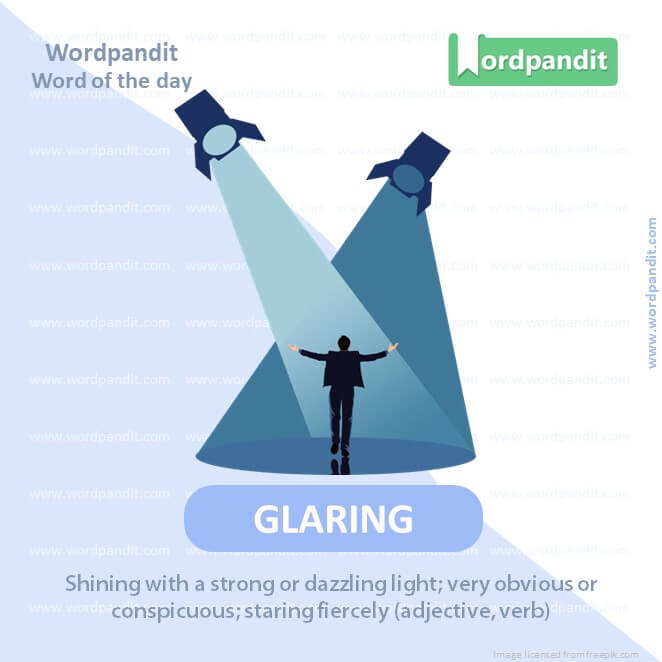
WORD-3: GLARING
CONTEXT: Silicon Valley remains a glaring exception. America’s tech giants are among the world’s largest and most innovative businesses; if they took a more open-minded approach to aging — if they considered solving the problems of older customers as eagerly as they chased teen fads — they could establish a model for aging in a tech-besotted world. Through advances focused on health care, home assistance, transportation, robotics and artificial intelligence, technology will be crucial to address the problems emerging from demographic imbalance. If there are not enough younger people to care for and cater to the needs of the old, we will increasingly lean on tech to add convenience, independence and perhaps even companionship to our lengthening sunset years.
SOURCE: The New York Times
EXPLANATORY PARAGRAPH: Imagine you see something super bright or obvious that you can’t miss it. Or when someone looks at you in a way that shows they’re really angry or upset, that’s “glaring”.
MEANING: Shining with a strong or dazzling light; very obvious or conspicuous; staring fiercely (adjective, verb).
PRONUNCIATION: Glair-ing
SYNONYMS: Blinding, shining, flashing, obvious, conspicuous, evident, staring.
USAGE EXAMPLE:
1. The sun was glaring down on us during the hike.
2. The mistake in the document was glaring.
3. She was glaring at him after he spilled her coffee.
4. The glaring lights in the stadium made it difficult to see.
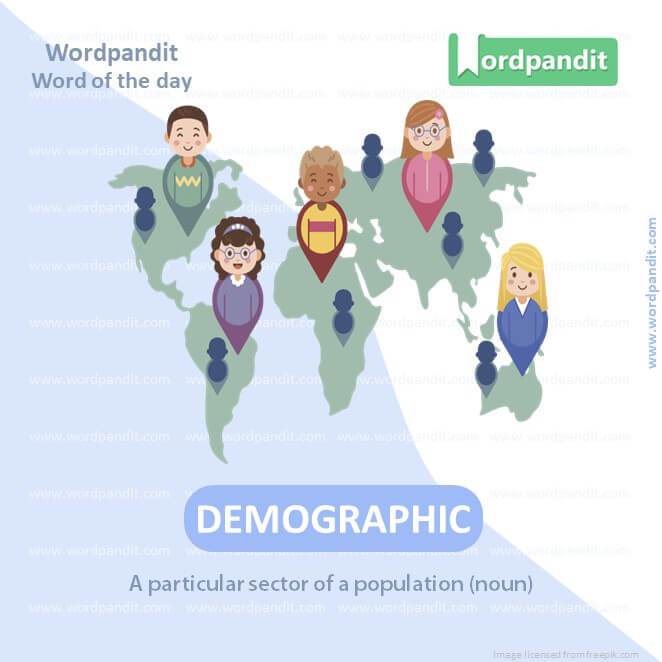
WORD-4: DEMOGRAPHIC
CONTEXT: Reports that North Korea’s dictator, Kim Jong-un, may visit Russia soon to meet Vladimir Putin – probably to discuss the supply of North Korean weapons for Putin’s war in Ukraine – point to a rather remarkable transformation of Russian-North Korean relations. During the cold war, North Korea was Moscow’s key ally in north-east Asia. But at that time, the North Koreans were, at best, poor supplicants to a mighty superpower. Today, Kim’s hermit kingdom stands tall and proud as Russia’s partner in crime.
SOURCE: The New York Times
EXPLANATORY PARAGRAPH: Let’s think of people as different groups. Some groups might be made up of kids, some of older people, some who like ice-cream, and some who love toys. “Demographic” is just a fancy word for these different groups of people.
MEANING: A particular sector of a population (noun).
PRONUNCIATION: Deh-mo-graph-ic
SYNONYMS: Population group, segment, sector, group, category, division.
USAGE EXAMPLE:
1. The toy company focused on the children’s demographic.
2. This magazine is popular among the teenage demographic.
3. Advertisers study various demographics to decide where to put their ads.
4. The demographic data showed a rise in young families in the area.
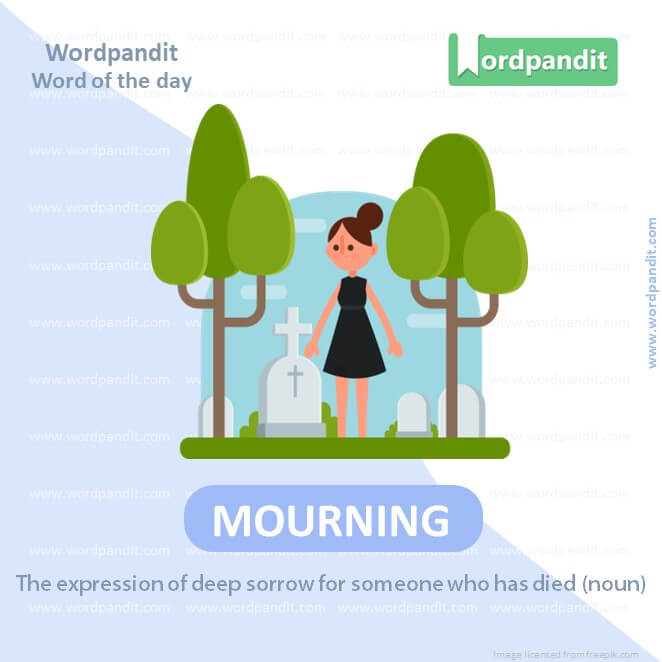
WORD-5: MOURNING
CONTEXT: For 50 years, I have been mourning the death of President Salvador Allende of Chile, who was overthrown in a coup the morning of Sept. 11, 1973. For 50 years, I have mourned his death and the many deaths that followed: the execution and disappearance of my friends and so many more unknown women
and men who shared our dreams of justice, equality and freedom. They were assassinated, detained, tortured and disappeared, and, like Allende, they were betrayed by those who should have protected them.
SOURCE: The New York Times
EXPLANATORY PARAGRAPH: Have you ever felt really sad because you lost something or someone you loved? That deep sadness and the time you spend feeling it is called “mourning”.
MEANING: The expression of deep sorrow for someone who has died, typically involving following certain conventions such as wearing black clothes (noun).
PRONUNCIATION: Mor-ning
SYNONYMS: Grieving, lamentation, sorrowing, bereavement, grief, lamenting, sadness.
USAGE EXAMPLE:
1. The entire nation was in mourning after the tragedy.
2. She wore black as a sign of mourning.
3. The period of mourning can vary for different individuals.
4. The community came together during the mourning of their beloved leader.
WORD-6: UNPRECEDENTED
CONTEXT: For 50 years, I have been mourning the death of President Salvador Allende of Chile, who was overthrown in a coup the morning of Sept. 11, 1973. For 50 years, I have mourned his death and the many deaths that followed: the execution and disappearance of my friends and so many more unknown women and men whom I marched with through the streets of Santiago in defense of Mr. Allende and his unprecedented attempt to build a socialist society without bloodshed.
SOURCE: The New York Times
EXPLANATORY PARAGRAPH: When something happens for the very first time and it has never happened before, we say it’s “unprecedented”. It’s like if you saw a purple unicorn – that would be unprecedented because no one has seen one before!
MEANING: Never done or known before (adjective).
PRONUNCIATION: Un-preh-seh-den-ted
SYNONYMS: Unheard of, unparalleled, unmatched, unique, novel, new.
USAGE EXAMPLE:
1. The athlete’s achievements were unprecedented in the history of the sport.
2. The pandemic led to an unprecedented global response.
3. The artist had an unprecedented style that captivated many.
4. Such an event was unprecedented in our town.
WORD-7: NECROPOLIS
CONTEXT: Spread over an area almost 7km (4 miles) long, Cairo’s Necropolis is a sprawling district of tombs, mausoleums, mosques, and courtyards. Also known as the City of the Dead, it is very much alive with memories of those buried there, with the different eras of history that it traces, and with the real families who live in it and have done so, in some instances, for generations. It dates back to the seventh century, and, like so much of historic Cairo, has always existed in an almost dizzying proximity with modernity. Billboards, construction, and heavy traffic rub shoulders with the silent tombs of intricate mosaics, ancient wooden doors, and hallowed spaces of mourning and remembrance. Buried there are not just ancient kings and dignitaries but more contemporary politicians, celebrities, and Cairenes who passed in recent decades.
SOURCE: The Guardian
EXPLANATORY PARAGRAPH: A “necropolis” is like a big city, but instead of homes for living people, it has places for those who have passed away, like big graveyards or tombs.
MEANING: A large, designed cemetery with elaborate tomb monuments (noun).
PRONUNCIATION: Neh-cro-pol-is
SYNONYMS: Graveyard, cemetery, burial ground, tomb, mausoleum, sepulcher.
USAGE EXAMPLE:
1. The ancient necropolis was discovered by archaeologists.
2. Tourists visited the necropolis to see the historic tombs.
3. The necropolis had been undisturbed for centuries.
4. A famous king was buried in that necropolis.
WORD-8: DIZZYING
CONTEXT: Spread over an area almost 7km (4 miles) long, Cairo’s Necropolis is a sprawling district of tombs, mausoleums, mosques, and courtyards. Also known as the City of the Dead, it is very much alive with memories of those buried there, with the different eras of history that it traces, and with the real families who live in it and have done so, in some instances, for generations. It dates back to the seventh century, and, like so much of historic Cairo, has always existed in an almost dizzying proximity with modernity. Billboards, construction, and heavy traffic rub shoulders with the silent tombs of intricate mosaics, ancient wooden doors, and hallowed spaces of mourning and remembrance. Buried there are not just ancient kings and dignitaries but more contemporary politicians, celebrities, and Cairenes who passed in recent decades.
SOURCE: The Guardian
EXPLANATORY PARAGRAPH: Have you ever spun around in circles and then felt like everything is spinning? That feeling is “dizzying”. It can also mean something is so amazing or surprising that it feels like your head is spinning!
MEANING: Causing a feeling of lightheadedness or of great surprise or excitement (adjective).
PRONUNCIATION: Diz-ee-ing
SYNONYMS: Spinning, bewildering, astonishing, staggering, vertiginous, surprising, shocking.
USAGE EXAMPLE:
1. The roller coaster had a dizzying drop.
2. The view from the top of the tower was dizzying.
3. She experienced a dizzying rush of emotions.
4. The pace of technological change can be dizzying.
WORD-9: PROXIMITY
CONTEXT: Spread over an area almost 7km (4 miles) long, Cairo’s Necropolis is a sprawling district of tombs, mausoleums, mosques, and courtyards. Also known as the City of the Dead, it is very much alive with memories of those buried there, with the different eras of history that it traces, and with the real families who live in it and have done so, in some instances, for generations. It dates back to the seventh century, and, like so much of historic Cairo, has always existed in an almost dizzying proximity with modernity. Billboards, construction, and heavy traffic rub shoulders with the silent tombs of intricate mosaics, ancient wooden doors, and hallowed spaces of mourning and remembrance. Buried there are not just ancient kings and dignitaries but more contemporary politicians, celebrities, and Cairenes who passed in recent decades.
SOURCE: The Guardian
EXPLANATORY PARAGRAPH: “Proximity” is like a fancy way to talk about how close something is to something else. Like, if your best friend lives right next door, you could say they live in close proximity to you!
MEANING: Nearness in space, relationship, or time (noun).
PRONUNCIATION: Prok-sim-i-ty
SYNONYMS: Closeness, nearness, adjacency, vicinity, propinquity, immediacy.
USAGE EXAMPLE:
1. The proximity of the school to my home is very
convenient.
2. The two countries are in close proximity.
3. Their offices are in close proximity to each other.
4. She liked the proximity of the park to her apartment.
WORD-10: HALLOWED
CONTEXT: Spread over an area almost 7km (4 miles) long, Cairo’s Necropolis is a sprawling district of tombs, mausoleums, mosques, and courtyards. Also known as the City of the Dead, it is very much alive with memories of those buried there, with the different eras of history that it traces, and with the real families who live in it and have done so, in some instances, for generations. It dates back to the seventh century, and, like so much of historic Cairo, has always existed in an almost dizzying proximity with modernity. Billboards, construction, and heavy traffic rub shoulders with the silent tombs of intricate mosaics, ancient wooden doors, and hallowed spaces of mourning and remembrance. Buried there are not just ancient kings and dignitaries but more contemporary politicians, celebrities, and Cairenes who passed in recent decades.
SOURCE: The Guardian
EXPLANATORY PARAGRAPH: “Hallowed” is a word that means something is very honored or holy. Think of a place where people go to pray or remember someone special – that place is hallowed.
MEANING: Made holy or consecrated (adjective).
PRONUNCIATION: Hal-oh-ed
SYNONYMS: Sacred, consecrated, holy, sanctified, blessed, venerated.
USAGE EXAMPLE:
1. The church stands on hallowed ground.
2. The monument is a hallowed symbol of freedom.
3. People visited the hallowed site to pay their respects.
4. The tradition is hallowed by time and custom.







